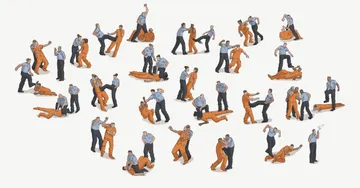As an emerging journalist serving time at Everglades Correctional Institution in Miami, I spend most of my days following leads, conducting interviews and writing down details from the inside that most on the outside can't — or don’t want to — understand.
I’ve reported for outside publications, like this Open Campus story about a Florida residency law that blocks incarcerated college students from in-state tuition. But I also write for The Endeavor, our institution newsletter. Last October, when I covered the 4th Annual Gang Prevention Summit for the newsletter, I expected to come out with a basic story. Instead, I left with something much more meaningful.
Themed “Homecoming,” the four-day event focused on the tools people in prison need to be successful when they go home. Wayne Rawlins, project manager of Miami-Dade County’s Anti-Violence Initiative, arranged the summit. Positive Peer Leadership, the program he sponsors here at the prison, hosted it.
The guests were diverse. Before the event began, I walked through the prison visitation park, mingling with county commissioners and fellow prisoners in blue as R&B played over the loudspeaker. I saw gang detectives speaking to retired Crips and community organizers laughing with the wardens. Inside, a crowd of about 100 was packed with professors and prisoners, everyone working toward the same goals: preventing youth violence and supporting children of incarcerated people.
I immediately recognized the name of the first speaker: It was Desmond Meade, the formerly incarcerated lawyer, voting rights activist and author. As executive director of the Florida Rights Restoration Coalition, he led the successful Amendment 4 campaign to return voting rights to 1.4 million Floridians with prior felonies. When he spoke to us in October, he’d just received the 2021 MacArthur Foundation “genius grant,” one of the biggest honors in the world.
Standing at our podium — in front of a wall with the quote, “It's never too late to become who you might have been” painted on it — was this man who left prison, earned his law degree, successfully fought for clemency in order to take the bar exam, and was a certified genius. He had flown in that morning from Orlando just to see us, the men who stood where he once did.
“Let me begin by saying that you all have value and I love you brothers,” he said before landing on the topic of his testimony — a commitment to something so strong that you're willing to sacrifice your life for it.
“In the ‘90s, I was willing to die to get high,” Mr. Meade said. “I was committed to destroying myself.” His turning point came in 2005 as he stood on some railroad tracks in Miami waiting for an incoming train to end his life. The train was delayed, and Mr. Meade, who had been incarcerated four times, went to a homeless shelter instead. My quickly scribbled notes outlined what came next: “Treatment center.” “Miami Dade College, law school.” “Recognition and respect.” “Family.”
“That train didn't come for a reason,” Mr. Meade continued. “Now I'm committed to something greater than myself. Everything I have is because I was willing to lay my life on the line to do God's work and help others.”
At some point, tears filled my eyes. I was amazed that this brilliant man was a recovering addict who had been to prison multiple times, just like me. When he confessed to standing on those railroad tracks, I remembered the time I stood on the Main Street Bridge in Jacksonville, staring down at the cobalt abyss and picturing my pill addiction ending once and for all.
Meade held nothing back. By talking directly to us and exposing his most vulnerable moments, he spoke to my healing chi. He spoke to the soul of this broken addict who had also felt suicidal. Suddenly, all of the days and nights that I’d spent writing and fighting to get more bylines seemed more worthwhile, because I'd seen what a higher purpose looked like.
When I caught Mr. Meade by the refreshments after his speech, I stuck out my hand, shared my admiration and requested an interview. “Of course,” he said with a smile. The interview was very short; he was quickly whisked away to catch a plane. Still, his last words reverberated through my consciousness: “Make society better than how you found it.”
Walking back from the event, I looked up at the chain link fence topped with sharp concertina wire. I got harassed by a guard who didn’t see my humanity, headed past a chapel that didn’t accept my philosophies, and arrived at the cell that holds me captive. But instead of seeing those things as oppressive, I looked at them as mere obstacles.
I can get around obstacles.
I know that next year, when I get out of prison, I will be one of the millions of formerly incarcerated people who can still do great things. Words like “junkie,” “destitute” and “criminal” have applied to me at some point in my life. But seeing Desmond Meade — a living example of redemption — reminded me that my sky is full of stars, my heart is full of hope, and my future is full of promise. When I approach every rising sun as an opportunity for a new beginning — even while living in a violent system — I can still find the humanity in others.
Ryan M. Moser is in recovery from drug addiction and is serving a 10-year sentence in Florida for nonviolent property crimes. His work has been published in dozens of literary journals and news outlets. Ryan received an honorable mention in nonfiction essays from PEN America in 2020. He is a Philadelphia native and father of two.
